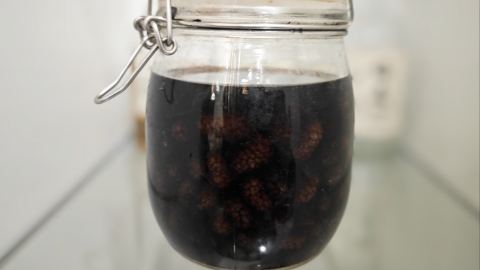The Efficacy, Functions, and Contraindications of Mulberry Wine
The benefits and functions of mulberry wine typically include nourishing yin and enriching blood, darkening hair and improving vision, enhancing immunity, promoting digestion, calming the nerves, and aiding sleep. However, there are also contraindications, such as diabetics should avoid consumption, pregnant and lactating women should consume cautiously, individuals with gastrointestinal diseases should not consume it, those with allergic constitutions should use it cautiously, and excessive consumption should be avoided.

I. Benefits and Functions
1. Nourishing Yin and Enriching Blood: Mulberry wine is rich in iron and anthocyanins. Iron helps promote hemoglobin production, while anthocyanins enhance hematopoietic function. Together, they can effectively improve symptoms such as sallow complexion, dizziness, and blurred vision caused by blood deficiency. This makes it particularly suitable for women and individuals with anemia to consume, helping them replenish blood and qi and achieve a healthy complexion.
2. Darkening Hair and Improving Vision: It contains various vitamins and amino acids. Vitamin A nourishes the retina, relieves eye fatigue, and improves vision. Substances such as melanin can nourish hair follicles and promote melanin synthesis. Long-term moderate consumption helps maintain black and lustrous hair and can also alleviate discomfort caused by excessive eye strain.
3. Enhancing Immunity: Mulberry wine contains resveratrol, flavonoids, and other components with antioxidant and anti-inflammatory properties. These ingredients can eliminate free radicals in the body and enhance the activity of immune cells. Regular consumption can boost the body's resistance, reduce the likelihood of illness, and defend against external pathogens.
4. Promoting Digestion: The fruit acid in the wine can stimulate gastric acid secretion, enhance gastrointestinal motility, aid digestion, and relieve problems such as indigestion and loss of appetite. At the same time, moderate alcohol content can also promote gastrointestinal blood circulation to some extent and improve digestive function.
5. Calming the Nerves and Aiding Sleep: Mulberry wine contains melatonin and various nutrients that can regulate nervous system function, relieve tension and anxiety, and promote sleep. Drinking a moderate amount before bedtime can help relax the body and mind, improve sleep quality, and alleviate insomnia and excessive dreaming.
II. Contraindications
1. Diabetic patients should avoid consumption: Mulberries have a high sugar content, and the sugar dissolves into the wine during fermentation. Consuming it can cause a rapid increase in blood sugar levels, worsening the condition. Diabetic patients should strictly avoid drinking mulberry wine to prevent affecting blood sugar control and triggering complications.
2. Pregnant and lactating women should consume cautiously: Alcohol can pass through the placenta or breast milk to the fetus or infant, affecting their growth and development and potentially leading to problems such as fetal developmental delay and intellectual impairment. Therefore, these two groups should not consume mulberry wine to ensure maternal and infant health.
3. Individuals with gastrointestinal diseases should not consume it: Alcohol can irritate the gastrointestinal mucosa, worsening conditions such as gastritis and gastric ulcers, leading to exacerbated symptoms like stomach pain, bloating, and acid reflux. Those with poor gastrointestinal function should avoid consumption to prevent the deterioration of their condition.
4. Individuals with allergic constitutions should use it cautiously: Some people may be allergic to mulberries or alcohol, and consuming mulberry wine may cause allergic reactions such as rashes, itching, and difficulty breathing. Individuals with allergic constitutions should be cautious when consuming it and may first try a small amount to confirm there are no allergic symptoms before drinking.
5. Avoid excessive consumption: Although mulberry wine has many benefits, excessive consumption can burden the liver, leading to alcohol-induced liver damage and other issues. Additionally, excessive alcohol intake may cause discomfort such as dizziness, headaches, nausea, and vomiting. Consumption should be strictly controlled to maintain appropriate levels.
Mulberry wine, as a functional beverage, offers health benefits when consumed in moderation, but excessive consumption may have negative effects. Especially for specific groups, individuals should carefully decide whether to consume it and determine the appropriate amount based on their own circumstances.




